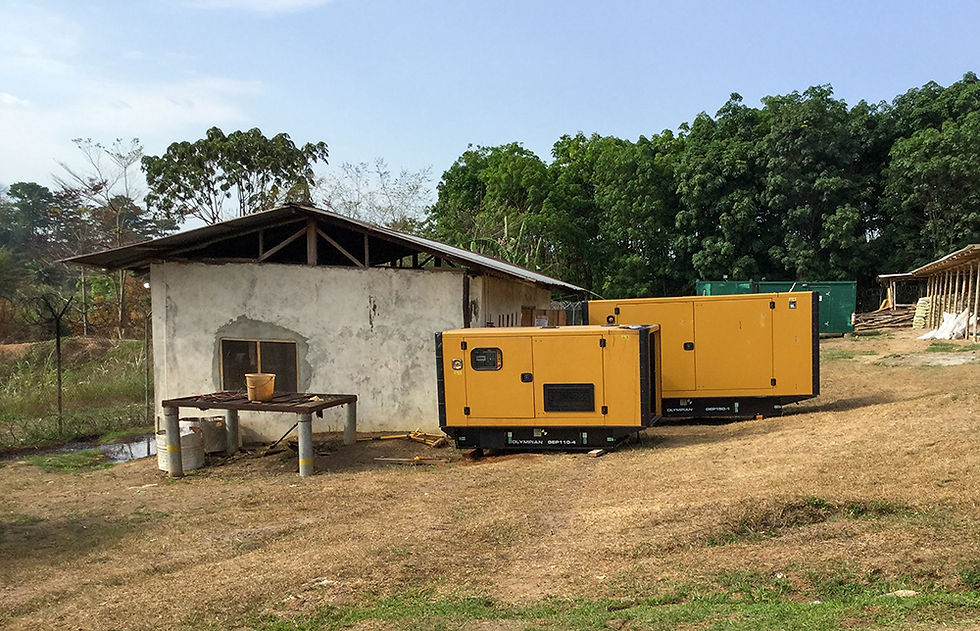Nigeria’s Diesel Generation Usage and Cultural Norms: An Intricate Web
- Jonny Appleton
- Jan 17, 2024
- 4 min read
Nigeria, the most populous country in Africa, grapples with a significant energy challenge.
Despite being rich in oil resources, the nation has paradoxically witnessed a rise in diesel generation usage due to infrastructural and cultural factors. Understanding the context of Nigeria's diesel reliance requires delving into both its economic realities and deeply entrenched cultural norms.

The Diesel Dependency: Economic and Infrastructural Context
Power Outages and Inadequate Infrastructure
Nigeria's national grid has consistently failed to meet the electricity demands of its burgeoning population. While Nigeria has 13,000 MW of installed electricity generation capacity, only less than 5000 MW is transmitted to the grid daily, caused in part by aging transmission infrastructure and erratic gas supplies (Energy Connects, 2023). Find out more here.
Frequent power outages are not only an inconvenience but also hamper economic activities. As a result, diesel generators have become ubiquitous, serving as a lifeline for households, businesses, and industries.
Economic Implications
The reliance on diesel generators imposes a heavy economic burden on individuals and businesses. High operational costs, maintenance expenses, and environmental degradation are some of the challenges that come with this dependency. Moreover, the cost of diesel fluctuates, making it an unpredictable energy source. In September 2023, the price of diesel in Nigeria increased by 4.27%, compared to August 2023 (Statista, 2023). Find out more here.
Cultural Norms and Diesel Generation: A Symbiotic Relationship
Cultural Acceptance
In Nigeria, owning a diesel generator is not just a matter of convenience but also a symbol of social status and resilience. Generators signify preparedness for inevitable power outages and demonstrate one's ability to navigate infrastructural deficiencies independently. Thus, there's a cultural acceptance and even reverence for diesel generators, which are viewed as essential commodities rather than luxury items. In a study enee.io conducted in 2023, 65% of respondents used diesel generators as their primary source of power.
Community Dynamics
Community-based support systems often revolve around shared access to electricity generated from diesel. In rural areas, communal diesel-powered facilities like boreholes and community centers play pivotal roles in fostering social cohesion. This shared reliance fosters a sense of community and collective responsibility, reinforcing the cultural norm of diesel dependency.
Business Norms
Nigeria's oil inducstry remains dominant with the petroleum industry accounting for approximately 10% of Nigeria's GDP, 70% of the country's revenue, and more than 83% of the country's export earnings (Practical Law, 2021). Find out more here.
Many local entrepreneurs seize opportunities to capitalize on the diesel demand by establishing mini-gas stations, selling generators, and offering maintenance services. This entrepreneurial landscape further solidifies the cultural acceptance of diesel generation as a viable and lucrative business venture.
Challenges and Environmental Concerns
Environmental Degradation
The widespread use of diesel generators contributes to environmental degradation through air and noise pollution. Despite the availability of cleaner energy alternatives, the cultural and economic factors sustaining diesel usage have impeded a transition to more sustainable practices. That's not to say that the increase in solar and investment in greener solutions isn't growing. The Nigerian solar off-grid market is among the fastest-growing in Africa, increasing at a 22% average annually over the past five years (Business Day, 2022). This offers hope that there is movement in the right direction, yet pollution and diesel dependence remain high. Find out more here.
Health Implications
Diesel emissions contain harmful pollutants that pose significant health risks to the population. Respiratory diseases, cardiovascular ailments, and other health complications are exacerbated by prolonged exposure to diesel fumes. Addressing these health implications necessitates a comprehensive approach that considers both infrastructural improvements and cultural shifts.
Potential Pathways Forward
Investment in Renewable Energy
To reduce dependency on diesel generators, Nigeria must prioritize investments in renewable energy sources such as solar, wind, and hydroelectric power. Government incentives, private sector collaboration, and international partnerships can accelerate the transition to cleaner energy alternatives.
Cultural Sensitization
Addressing Nigeria's diesel dependency requires a nuanced understanding of the cultural norms and socio-economic dynamics at play. Efforts to promote sustainable energy practices must be culturally sensitive, acknowledging the importance of diesel generators, while highlighting the benefits of cleaner alternatives.
Infrastructure Development
Enhancing Nigeria's energy infrastructure is paramount to reducing reliance on diesel generators. Upgrading the national grid, improving transmission and distribution systems, and diversifying energy sources can mitigate the challenges associated with inadequate infrastructure.
Product Innovation
Increasing the availability of energy efficiency technology within the energy sector can pave the way for decreased dependency on diesel. enee.io has developed a monitoring system that measures diesel generator usage to give users visibility into where the inefficiencies lie, and offers insights into the environmental and financial cost savings brought about by the addition of renewable energy. Keeping systems running efficiently and through decreased diesel dependency. Find out more here.
Conclusion
Nigeria's diesel generation usage is intricately linked to its economic realities, infrastructural deficiencies, and deeply entrenched cultural norms. While diesel generators have provided a lifeline amidst power outages and infrastructural challenges, they also pose significant environmental, health, and economic implications. Addressing Nigeria's diesel dependency requires a multifaceted approach that combines investments in renewable energy, infrastructural development, and cultural sensitization. By understanding the complexities surrounding diesel generation usage, stakeholders can collaboratively work towards a sustainable energy future for Nigeria.